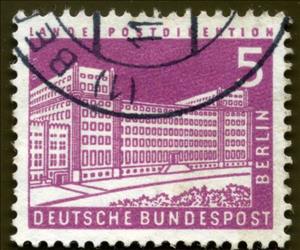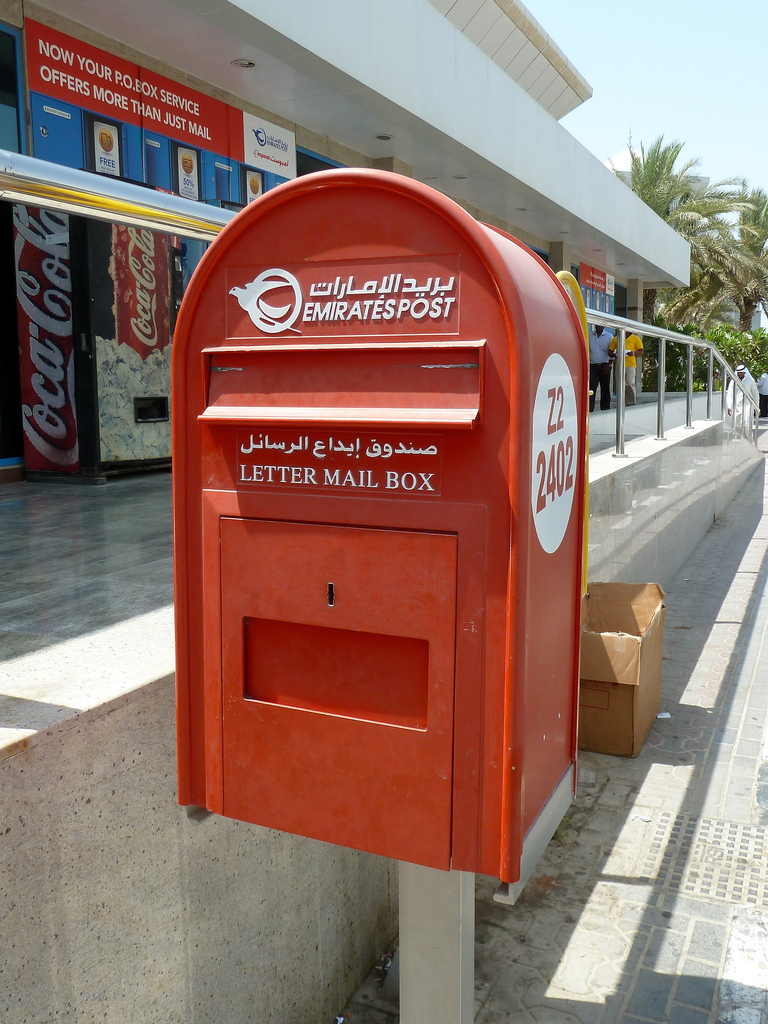Stamp: Post management building of state (Berlin 1958)
Post management building of state (Berlin 1958)
01 May (Berlin ) within release Berlin cityscapes goes into circulation Stamp Post management building of state face value 5 German pfennig
| Stamp Post management building of state in catalogues | |
|---|---|
| Michel: | Mi: DE-BE 141xw |
Stamp is horizontal format.
Also in the issue Berlin cityscapes:
- Stamp - Charlottenburg Palace face value 40;
- Stamp - Post management building of state face value 5;
- Stamp - Chamber of industry and commerce with stock exchange face value 60;
- Stamp - Reuter powerplant face value 50;
- Stamp - Schiller theatre face value 70;
- Stamp - Henry Ford building of the free University,Dahelm face value 20;
- Stamp - Ruins of the Kaiser Wilhelm Memorial Church face value 10;
- Stamp - Radio tower and exhibitions halls face value 7;
- Stamp - Pfaueninsel palace face value 30;
- Stamp - Statue of Great Elector face value 1;
- Stamp - Post management building of state face value 5;
- Stamp - Congress Hall, Berlin face value 3;
- Stamp - Lilienthal monument,Lichterfelde face value 25;
- Stamp - Air brigde monument, Tempelhof face value 15;
- Stamp - Air brigde monument,Tempelhof face value 15;
- Stamp - Brandenburg Gate face value 1;
- Stamp - Air bridge monument, Tempelhof face value 15;
Stamp Post management building of state it reflects the thematic directions:
Architecture (Latin architectura, from the Greek ἀρχιτέκτων arkhitekton "architect", from ἀρχι- "chief" and τέκτων "builder") is both the process and the product of planning, designing, and constructing buildings and other physical structures. Architectural works, in the material form of buildings, are often perceived as cultural symbols and as works of art. Historical civilizations are often identified with their surviving architectural achievements.
A building or edifice is a structure with a roof and walls standing more or less permanently in one place, such as a house or factory. Buildings come in a variety of sizes, shapes and functions, and have been adapted throughout history for a wide number of factors, from building materials available, to weather conditions, to land prices, ground conditions, specific uses and aesthetic reasons. Buildings serve several needs of society – primarily as shelter from weather, security, living space, privacy, to store belongings, and to comfortably live and work. A building as a shelter represents a physical division of the human habitat (a place of comfort and safety) and the outside (a place that at times may be harsh and harmful).
An office is a space where the employees of an organization perform administrative work in order to support and realize the various goals of the organization. The word "office" may also denote a position within an organization with specific duties attached to it (see officer or official); the latter is an earlier usage, as "office" originally referred to the location of one's duty. In its adjective form, the term "office" may refer to business-related tasks. In law, a company or organization has offices in any place where it has an official presence, even if that presence consists of a storage silo, for example, instead of a more traditional establishment with a desk and chair. An office is also an architectural and design phenomenon, including small offices, such as a bench in the corner of a small business or a room in someone's home (see small office/home office), entire floors of buildings, and massive buildings dedicated entirely to one company. In modern terms, an office is usually the location where white-collar workers carry out their functions.
The mail or post is a system for physically transporting documents and other small packages; or, the postcards, letters, and parcels themselves. A postal service can be private or public, though many governments place restrictions on private systems. Since the mid-19th century national postal systems have generally been established as government monopolies with a fee on the article prepaid. Proof of payment is often in the form of adhesive postage stamps, but postage meters are also used for bulk mailing. Modern private postal systems are typically distinguished from national postal agencies by the names "courier" or "delivery service". Postal authorities often have functions other than transporting letters. In some countries, a postal, telegraph and telephone (PTT) service oversees the postal system, in addition to telephone and telegraph systems. Some countries' postal systems allow for savings accounts and handle applications for passports.




